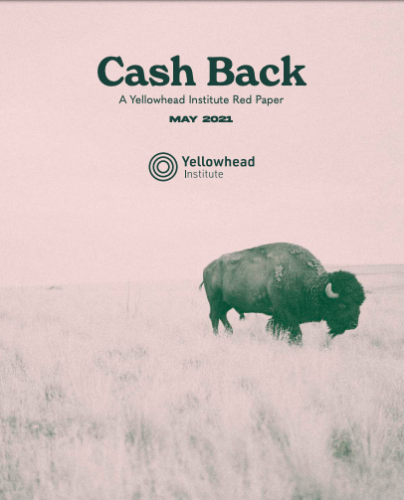THIS REPORT is about the value of Indigenous lands.
Picking up from Land Back, the first Red Paper by Yellowhead about the project of land reclamation, Cash Back looks at how the dispossession of Indigenous lands created a dependency on the state due to the loss of economic livelihood. Cash Back is about restitution from the perspective of stolen wealth.
From Canada’s perspective, the value of Indigenous lands rests on what can be extracted and commodified. The economy has been built on the transformation of Indigenous lands and waterways into corporate profit and national power. In place of their riches in territory, Canada set up for First Nations a weak, impoverished fiscal system — a cradle-to-grave bureaucracy — to control life through a stranglehold on each and every need.
What is at stake here in Cash Back is the restitution of Indigenous economies. Canada’s dysfunctional fiscal system for First Nations is not an Indigenous economy.
An Indigenous economy would be built upon the jurisdiction of Indigenous nations over our territories, not the 0.2 percent economies of reserves and the federal transfer system. Therefore, this report is explicitly about reparations and not about adjustments to the status quo. Cash Back is not a charity project; it is part of a decolonization process.
Colonization is an economic project based on land theft. It requires a political system that operates through domination and violence to maintain this theft. Therefore, that which enriches the settler state necessarily impoverishes and criminalizes the colonized.
But wealth is not exclusive to this economic system — a form of accumulation based in hoarding and exploitation. There are many other ways a society can thrive, depending on the knowledge through which we come to know the world. As the Secwepemc leader George Manuel describes in The Fourth World:
Our economy carried on because it was being held together by a substance much stronger than the simple list of raw materials with which we worked.
The roots and berries, fish and meat, bark and moss, are a list of ingredients that cannot by themselves make a whole cloth.
There is only organizing when those raw materials are brought together on the loom of social values toward which people choose to work.
It is the underpinning value system that provides (or denies) the conditions for well-being, in other words.
In Canada, the economy can’t be understood outside of the problem of land. This report is focused on cash and the different roles it has played in this colonial country. It is the companion-analysis to Land Back and perhaps, a less told story, though every bit as critical.
In many ways, money has become the language of colonization itself.





